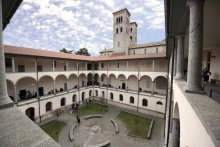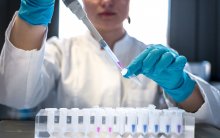Ph.D Course
Restricted access
3
Varese
Italian
DIPARTIMENTO DI BIOTECNOLOGIE E SCIENZE DELLA VITA
Course description
The PhD Program in Life Sciences and Biotechnology (DSVB) promotes strongly interdisciplinary training and research paths. It allows to develop multidisciplinary research topics within national and international networks of excellence, in particular in the following areas:
- Health (from the molecular mechanisms of pathologies to medical technologies for the identification of new therapeutic strategies);
- Environment (with particular regard to sustainability and the challenges of the circular bioeconomy);
- Sustainable plant production.
The general aim of the PhD Program is to provide advanced knowledge and tools, which allow the PhD to design, implement and manage competitive research projects. Through an interdisciplinary approach, the DSVB promotes the acquisition of knowledge deriving from basic biological disciplines (molecular, cellular and at the organism level) and applications in the industrial and biomedical field, as well as in sustainable production and ecosystem conservation.
The PhD Program is intended to train professional figures with a high scientific profile who can integrate into academic experimental science and research, but also within production companies, thanks to interaction with the entrepreneurial fabric of the territory.
Once the Program has been completed, the PhD students will have acquired experience in advanced research methods, analytical skills and abilities in the critical processing of experimental data, as well as specific skills in the field of study of their interest, which they will then be able to apply, in a multidisciplinary context, to complex problem solving.
What you need to know
All master degree graduates (graduate degrees, single-cycle graduate degrees or other qualification obtained abroad and recognized as equivalent) can access the PhD course, especially graduates in: Biotechnology, Medicine and Surgery, Dentistry, Veterinary Medicine, Communication Sciences and Techniques, Life sciences, Pharmacy, Psychology, Chemistry and pharmaceutical technologies, Physical sciences, Environmental sciences, Engineering, Agricultural science and technology, Food preparation sciences, Sciences and animal husbandry technologies, Natural sciences, Sciences of technical health professions.
Opportunities and support
With this Award, the Doctoral College in Life Sciences and Biotechnology recognizes the best scientific work published during the past calendar year by one of the students participating in the PhD Program. All the enrolled PhD students can participate, by applying to the specific call (usually issued in June/July).
Enrollment
The PhD is established for the XL cycle.
The following are planned:
Positions: 9
- Positions Scholarships: 7
- Places without scholarship: 2
To register, you must apply to the selection call.
Class attendance
PhD Course start date: 1 November 2024
Considering the interdisciplinary approach and the addressed topics, a path is proposed that aims at the specificity of scientific profiles through a multidisciplinary and varied offer of common training activities, which then differs in the development of research projects.
The teaching activities are provided in person and in mixed mode (upon motivated request) and may include practical activities (experimental or computational).
The proposed didactic activities are grouped into 5 categories:
- Characterizing (proposed by the PhD Program, mandatory);
- Transversal (proposed by the Doctoral School, optional and mandatory);
- Seminars (proposed by the PhD Program, by the University or by other Universities, consisting of free-choice seminars, lessons and workshops);
- Reports (oral and written presentations by PhD students, mandatory at the end of each year of the course);
- Improvement of the English language (courses offered by the University in preparation for the acquisition of English language certifications, optional).*
*At the end of the PhD path, B2 English language certification is required, which is mandatory for the acquisition of the title.
Studying
Teaching Activities
The DSVB has been designed and is proposed as a training tool for research activity through the acquisition of advanced theoretical and methodological skills in the field of biotechnological sciences (involving chemical, biochemical, genetic, bioinformatics, microbiological and medical disciplines), and by encouraging the integration of complementary skills and application transfer. The educational path addresses the frontier issues of Life Sciences by promoting the systemic, cellular, molecular and biotechnological approach in the study of complex problems through the use of model systems in the fields of biology, biomedicine and (bio)chemistry, but also offers transversal activities for the improvement of relational, communication and linguistic skills.
A training course is proposed that includes common teaching activities, in addition to those freely chosen by the PhD student, which therefore differs based on research interests and is functional to the acquisition of useful skills for the development and management of the PhD's own research project.
- Common Characterising Activities (mandatory):
1st year:
Course: Biostatistics
Teacher: Giorgio Binelli
Length: 3 CFU (24 hours)
Objective: All fields of modern biology cannot be successfully approached without a knowledge of their statistical and biometrical aspects. It is thus necessary to provide the student with interlaced biological and statistical knowledge. The goal of this course is to make the students familiar with the statistical theory and terminology, so to understand the power and pitfalls of statistical analysis, with special emphasis on the planning of the experiments and the analysis of experimental data in the field of Life Sciences.
Course: Trends in Biomolecular Science
Teacher: shared among members of the PhD course
Length: 2.5 CFU (20 hours)
Objective: Biomolecular science is a research area that profits from a strong multidisciplinary expertise on genetics, microbiology, molecular and cell biology, structural biology, biochemistry, synthetic and systems biology, etc. This course is aimed to provide advanced and updated knowledge through a theoretical and practical training oriented to provide the required skills for supporting the students in their biotechnological research projects (in the different fields of application).
Course: Transversal skills
Module A: Information Literacy; Digital Literacy, Doctoral thesis and copyright; Open access; Collecting and processing information
Teacher: shared among members of the PhD course and external professionals
Length: 0.5 CFU (4 hours)
Objective: Despite the undisputable value of specialized skills, the transversal ones represent a main key to professional success, according to some scientific studies. Transversal or soft skills pertain to cognitive, creative, managerial, relational and communication areas. Not only they represent the “most wanted” competences indicated by the corporate sector, but they are also essential life skills. Acquiring these skills provides students with the basic knowledge, abilities and qualities required to translate competences into suitable behavior for organizational purposes and for their professional evolution and success.
2nd year:
Course: Bioinformatics
Teacher: Gianluca Molla
Length: 2.5 CFU (20 hours)
Objective: Provide student with practical knowledge of the main bioinformatic processes used in protein investigation. All lessons will be held at the computer, in an informatics class. Most of procedures shown will be performed by the students themselves under the supervision of the teacher. Results will be discussed in a critical manner.
*Scheduled every two years
Course: Transversal skills
Module B: Presentation skills; Problem solving; Results dissertation
Teacher: shared among members of the PhD course and external professionals
Length: 0.5 CFU (4 hours)
Objective: Despite the undisputable value of specialized skills, the transversal ones represent a main key to professional success, according to some scientific studies. Transversal or soft skills pertain to cognitive, creative, managerial, relational and communication areas. Not only they represent the “most wanted” competences indicated by the corporate sector, but they are also essential life skills. Acquiring these skills provides students with the basic knowledge, abilities and qualities required to translate competences into suitable behavior for organizational purposes and for their professional evolution and success.
Course: Trends in Biomolecular Science
Teacher: shared among members of the PhD course
Length: 2.5 CFU (20 hours)
Objective: Biomolecular science is a research area that profits from a strong multidisciplinary expertise on genetics, microbiology, molecular and cell biology, structural biology, biochemistry, synthetic and systems biology, etc. This course is aimed to provide advanced and updated knowledge through a theoretical and practical training oriented to provide the required skills for supporting the students in their biotechnological research projects (in the different fields of application).
3rd year:
Course: Transversal skills
Module C: Economy; Project Management; Patents & trademarks; European research programs
Teacher: shared among members of the PhD course and external professionals
Length: 0.5 CFU (4 hours)
Objective: Despite the undisputable value of specialized skills, the transversal ones represent a main key to professional success, according to some scientific studies. Transversal or soft skills pertain to cognitive, creative, managerial, relational and communication areas. Not only they represent the “most wanted” competences indicated by the corporate sector, but they are also essential life skills. Acquiring these skills provides students with the basic knowledge, abilities and qualities required to translate competences into suitable behavior for organizational purposes and for their professional evolution and success.
- Transversal activities (mandatory and optional) to follow during the three years PhD course:
Course: INNOVATION CAMP FOR PHD STUDENTS
Teacher: Prof. Mauro Fasano, Prof.ssa Alessia Pisoni, Prof. Andrea Vezzulli
Course: INTRODUCTION TO SYSTEMS BIOLOGY - Transversal activity organized by the PhD Course in Experimental and Translational Medicine
Teacher: Prof. Mauro Fasano
Course: SAFETY IN THE LABORATORY
Teacher: Prof. Carlo Lucarelli, Prof. Stefano Fanetti, TBD
Course: ARTIFICIAL INTELLIGENCE
Teacher: Prof. Mauro Fasano
Course: RESEARCH INTEGRITY
Teacher: Prof. Marco Cosentino
Course: ACADEMIC WRITING AND PUBLISHING
Teacher: Prof. Andrea Vezzulli
Course: PERSONAL BRANDING
Teacher: TLC
Course: PUBLIC SPEAKING
Teacher: TLC
Course: PROJECT MANAGEMENT
Teacher: TLC
Description of Transversal Activities
- Seminars (free-choice)
Seminars, courses and other didactic activities organized by the Doctoral School, by other PhD Program at the university of Insubria, or by other Universities (provided attendance and credits are certified), at the free choice of the PhD student, for a total of 0.5 CFU (4 hours) per each year of the PhD Program.
These activities are included in the DSVB training program to allow PhD students to build their own advanced training path, which reflects their scientific interests. They can therefore choose and plan to attend seminars during the three years of the PhD Program, in order to acquire targeted theoretical and practical knowledge on different topics, which they will then be able to apply to their specific field of research and which will allow them to adopt alternative and/or innovative solutions to the problems related to their project.
- English language:
Course on multimedia software platform (MacMillan English Campus - MEC) – an activity proposed by the University of Insubria for PhD students.
English language course preparing PhD students for the B2 level certification.
Experimental activity and active involvement in research projects have a central role in the training of doctoral students. The main areas of investigation concern:
- the study of the structure, function and regulation of genes and proteins for the understanding of biological processes;
- microbiological applications in the pharmaceutical and industrial fields;
- the development of innovative biotechnological processes through the use of enzymes, microorganisms, invertebrates;
- the characterization of the response of animal and plant organisms to environmental factors with the aim of improving their productivity and resistance to stress;
- medical biotechnologies from regenerative medicine to various applications in clinical research.
Available research projects:
1. "Micro and nano plastics: evaluation of biological resposes in animal and cell models"
Prof. Bernardini, Prof.ssa Gornati
2. "D-amino acids metabolism in human brain: role in health and disease"
Prof. Piubelli, Prof. Pollegioni
3. "Development of sustainable synthetic biology processes for the recycling and upcycling of waste feedstocks"
Prof. Molla
4. "Investigating the role of proline dehydrogenase in tumor progression and cancer cell resistance to tyrosine kinase inhibitors"
Prof.ssa Sacchi, Prof.ssa Campomenosi
5. "The response of microbial cells to the visible light: stressor and potential antimicrobial strategy for applications in feed/food, clinical and industrial fields"
Prof.ssa Orlandi
6. "Sarcomas of the sinonasal tract: new frontiers in management of rare entities based on their biological fingerprint"
Prof. Battaglia
7. "Unveiling the influence of micro and nano plastics pollution on plant growth and tissues concentration: the interplay with other pollutants and biochar amendment"
Prof. Montagnoli
8. "Study of antibiotic resistance genes mobilized in an aquatic environment subjected to various levels of contamination"
Prof.ssa Marinelli
9. "Artificial muscle for long-standing facial paralysis: characterization studies on innovative contractile polymers with related implantable stimulation system and preclinical studies in animal models"
Prof. Battaglia
For information
PhD in Life Sciences and Biotechnology Office
Dipartimento di Biotecnologie e Scienze della Vita
Via Dunant, 3 - 21100 Varese
E-mail: dottorato.dbsv@uninsubria.it
Tel.: 0332211443
Prof.ssa Silvia Sacchi: silvia.sacchi@uninsubria.it





